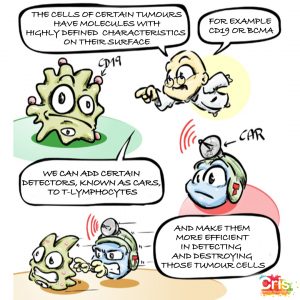After just one year in operation, the CRIS Unit for Research and Advanced Therapies in childhood cancer based at Madrid’s Hospital de la Paz has shown that immunotherapy treatments using CAR-T cells are effective in children with certain types of leukaemia who do not respond to conventional treatments.
For this reason, the CRIS Cancer Foundation will stay true to its commitment to research as the only way to beat this disease.
Effective cell therapy for many types of leukaemia
After being treated for one month at the CRIS Unit for Research and Advanced Therapies in Childhood Cancer in the Hospital de la Paz, using CAR-T cells, an 11-year-old boy has fully recovered from B-Cell Acute Lymphoblastic Leukaemia (B-ALL), according to the tests conducted. He is now in full remission after being treated using a therapy generated from his own lymphocytes. He has been discharged, as all the signs and symptoms of cancer have disappeared, and all his blood tests are now normal.
Dr. Antonio Perez, Head of the Paediatric Haematology-Oncology Service at the Hospital de La Paz and director of the CRIS Unit, says: “These new treatments, which are not conventional medications, are based on T cells, lymphocytes taken from the patient’s own immune system that are extracted from their blood and then genetically modified in a lab to detect and attack certain cancer cells.
They can be used for certain types of cancer (leukaemia or lymphoma), in patients who have not responded to conventional treatments“.

ADVANCES MADE BY THE CRIS UNIT OF RESEARCH AND ADVANCED THERAPIES IN CHILDHOOD CANCER
Since it first began operating, this unit has treated more than 30 children with a wide variety of pathologies, from acute lymphoblastic leukaemia or acute myeloblastic leukaemia, to solid tumours, primary immunodeficiencies or Hodgkin’s lymphoma, thanks to the application of cell therapy and immunotherapy.
Bearing in mind that the majority of children who come to this unit have no alternative treatment or have suffered a relapse, it is essential to know the genetic details of the cancer affecting each patient. Through the FastTrack project, the CRIS Unit systematically sequences the tumours of new incoming patients, to search for therapeutic targets and possible new avenues of treatment if any of the current therapies fail.
Furthermore, advances have been made to validate the production and use of CAR-T cells in various clinical trials for different types of solid and haematological tumours. Along these same lines, the Unit is working to validate its facilities and the production of cellular therapies with Natural Killer cells, a type of immune system cell that specialises in the destruction of tumours, to combat childhood sarcomas and brain tumours. The researchers at this Unit are also working to combine these same Natural Killer cells with other types of immunotherapy to combat neuroblastoma, another type of very aggressive childhood tumour.
One of the objectives of the group is to show the efficacy and safety of therapies using T lymphocytes that have been genetically engineered to incorporate a molecule characteristic of Natural Killer cells. Through genetic engineering, the NKG2D receiver will be added to T lymphocytes, which will result in hybrid cells, or chimeric antigen receptors known as NKG2D-CAR. The advantages of these cells is that they recognise a broad spectrum of tumour cells, just as NK cells do, and, also, they have the effectiveness and capacity to generate the immunological memory of T-lymphocytes.
The research being conducted by the Unit is working to optimise the generation of these types of cells, demonstrate their safety, and to use them as cellular therapy in clinical trials to treat neuroblastoma and medulloblastoma, along with other types of tumours.